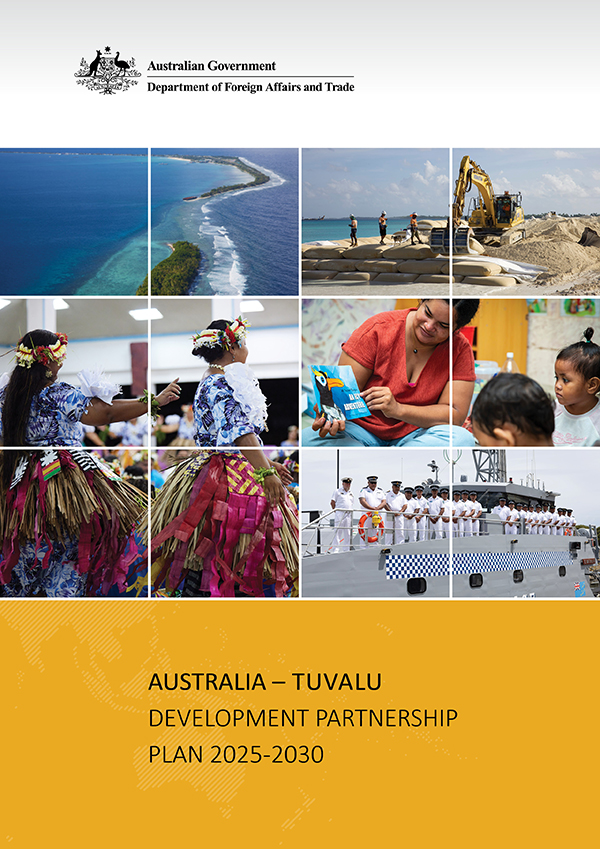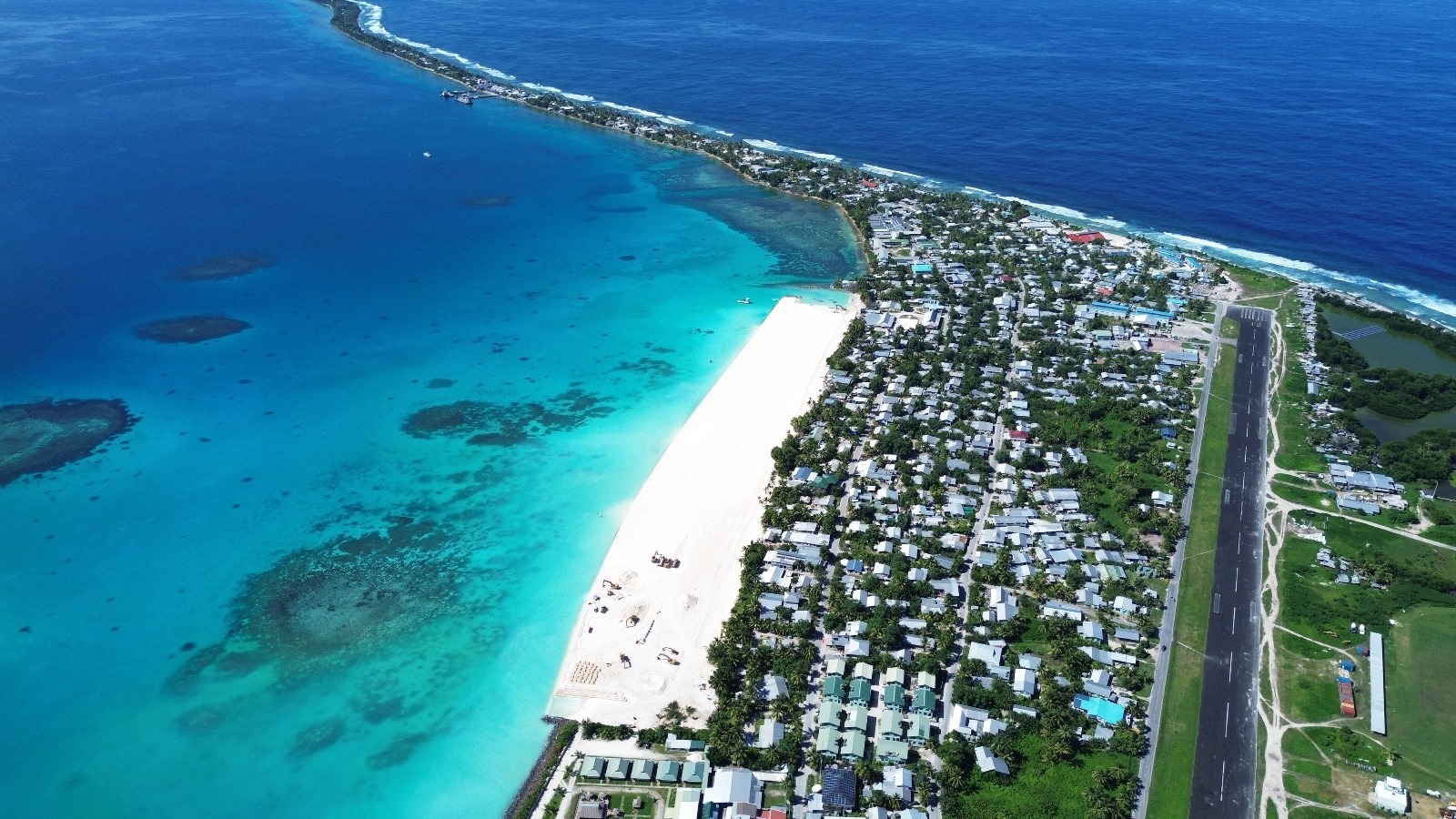-
2025-26 bilateral allocation [budget estimate]
-
$26.0 million
-
2025-26 total Australian ODA [budget estimate]
-
$47.0 million
-
2024-25 bilateral allocation [budget estimate]
-
$26.0 million
-
2024-25 total Australian ODA [budget estimate]
-
$86.7 million
-
2023-24 total Australian ODA [actual]
-
$60.3 million
Australia has elevated its partnership with Tuvalu through our historic Australia-Tuvalu Falepili Union treaty. This is our response to a request from Tuvalu to safeguard the future of Tuvaluans as the impacts of climate change worsen. The Falepili Union comprises a treaty and commitments articulated in a joint statement.
As part of the Falepili Union, Australia has agreed to an enhanced development partnership that will support Tuvaluans to protect their future, identity, and culture. Australia's development cooperation program in Tuvalu responds to the Government of Tuvalu's priorities, including climate adaptation, education, health, telecommunications, connectivity, and economic resilience.
Australia will continue to work closely with Tuvalu to realise its vision of 'a peaceful, resilient and prosperous Tuvalu', as outlined in Te Kete (Tuvalu's National Development Strategy).
Under the Falepili Union, and consistent with the 2018 Pacific Island Forum (PIF) Boe Declaration's expanded concept of security, Australia will assist Tuvalu in response to major natural disasters, public health emergencies of international concern, and military aggression. This reflects our joint understanding that our interests are intertwined, and that our security and sovereignty are best assured by acting together.
We will deliver our commitments to each other in the Pacific way – with humility, mutual respect and open and honest dialogue. As members of the PIF, Australia and Tuvalu will work together to advance our shared vision for a peaceful, stable and prosperous Pacific.
Joint objectives of the Australia-Tuvalu Development Partnership Plan 2025-2030
The overarching goal of the Australia – Tuvalu Development Partnership Plan 2025- 2030 is to contribute to a resilient Tuvalu, which safeguards the future of Tuvalu's people, identity and culture. Three objectives ('pillars') have been identified to contribute to this goal, each with a set of priority outcomes. These reflect the principles and priorities reviewed, discussed and agreed in consultation by Tuvalu and Australia.
The pillars are interconnected and mutually reinforce the overarching goal. Key themes such as climate change, gender equality and disability equity, and culture are relevant to all pillars. A mid-cycle review of the development partnership will consider the effectiveness of delivery approaches and the investment pipeline.
Objective 1: Creating opportunities for all to 'stay and thrive'
Central to Australia and Tuvalu's shared vision of mobility with dignity is investing so that Tuvaluans can stay and thrive in their homeland. Australia will continue to support critical sectors including health and education; promoting gender equality, disability and social inclusion; deepen our sporting and church connections; and increasing our focus on culture through our development programs. Preserving and promoting Tuvaluan culture, traditions and wellbeing is central to our partnership. This will be reinforced by our efforts to strengthen connections between our countries and enhance Tuvalu's resilience.
Objective 2: Connecting Tuvalu with Australia and the region
We are fostering closer connections between Tuvalu, Australia and the region. Australia has commenced a multi-year connectivity partnership to provide greater economic opportunities. We are reinforcing our people-to-people ties – supporting the easier movement of people between our countries and strengthening jobs and skills opportunities for Tuvaluans in Australia and the Pacific.
Objective 3: Enhancing resilience in the face of shocks
We know that there is no prosperity without security and the impacts of climate change remain the single greatest threat to the livelihoods, security and wellbeing of the people of Tuvalu. Australia will continue to support Tuvalu's efforts to stay and thrive in their territory and retain their deep, ancestral connections to the land and sea. We are expanding our security cooperation, deepening our economic partnership to respond more effectively and strengthening economic opportunities, which will enhance Tuvalu's resilience to all hazards.
Climate change
Tuvalu is highly vulnerable to the impacts of climate change, especially sea level rise. Due to limited land area, all human settlements are effectively coastal. Storm surges, king tides, and sea flooding are common occurrences and future sea level rise poses a devastating threat to Tuvalu's way of life.
Existing Australian programming supports a comprehensive agenda of climate resilience in Tuvalu. The Falepili Union treaty – for the first time in a treaty-level agreement – recognises Tuvalu's continued statehood notwithstanding the impacts of sea level rise. Australia's commitment to the Tuvalu Coastal Adaptation Project is supporting Tuvalu's world-leading climate adaptation efforts to protect its people.
Australia will build on these investments by continuing our climate change support in line with the Government of Tuvalu's ambitions and by integrating climate change into all our programming. Australia will leverage our unique position as a trusted partner, with international convening power, to further crowd-in support for Tuvalu's climate adaptation priorities.
Gender equality, disability and social inclusion (GEDSI)
Tuvalu has made significant achievements over the past two decades to increase awareness of gender equality, domestic violence and the importance of women's economic participation and participation in decision-making.
Australia is the primary funder of gender equality programs in Tuvalu. The Australian High Commission's Gender Equality Country Plan for Tuvalu (2023–2027) was developed in close consultation with the Government of Tuvalu and partners.
As a Pacific Islands Forum member, Tuvalu committed to the Pacific Framework for the Rights of Persons with Disabilities 2016–2025. Australia will continue to work with Tuvalu to advance the rights of people with disability in line with Australia's International Disability Equity and Rights Strategy.



